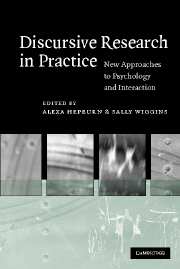Book contents
- Frontmatter
- Contents
- List of figures
- List of contributors
- Acknowledgements
- 1 Discursive research: themes and debates
- Part I Psychology in action
- Part II Professionals and clients
- Part III Youth and institutions
- 11 ‘Doing reluctance’: managing delivery of assessments in peer evaluation
- 12 A valid person: non-competence as a conversational outcome
- 13 Discursive practices in talking problems during a school–family meeting
- 14 Food abuse: mealtimes, helplines and ‘troubled’ eating
- 15 Discursive research: applications and implications
- Appendix: transcription notation
- References
- Index
12 - A valid person: non-competence as a conversational outcome
Published online by Cambridge University Press: 04 November 2009
- Frontmatter
- Contents
- List of figures
- List of contributors
- Acknowledgements
- 1 Discursive research: themes and debates
- Part I Psychology in action
- Part II Professionals and clients
- Part III Youth and institutions
- 11 ‘Doing reluctance’: managing delivery of assessments in peer evaluation
- 12 A valid person: non-competence as a conversational outcome
- 13 Discursive practices in talking problems during a school–family meeting
- 14 Food abuse: mealtimes, helplines and ‘troubled’ eating
- 15 Discursive research: applications and implications
- Appendix: transcription notation
- References
- Index
Summary
Putting autism into context
Dealing with a condition such as autism is intimidating if one is not a clinician, especially if the interactions examined are in a therapeutic setting and experts are involved; but we were supported in our research by the significant contributions made in other studies to the understanding of social situations involving people with communicative disabilities, autism-related (see below) or otherwise originated. We shall not attempt an explanation of autism as a syndrome, but will touch upon research that has looked at the social situations which constitute the everyday life of people – especially children – diagnosed with autism.
Existing theories accounting for the most common symptoms of the autistic-spectrum disorder are grounded in extended experimental research (see overviews in Frith, 1989; Baron-Cohen et al., 1993, 1989; Sigman and Capps, 1997) but there is also evidence that changing the nature of the tests, for example by introducing objects familiar to the children, can produce better performance (e.g., in Theory of Mind tests: cf. Astington and Gopnik, 1991). Bushwick (2001) suggested that the unusual behaviour of autistic individuals generates impoverished social experiences leading to insufficient social learning. Some aspects of autistic behaviour, like echoing, eye aversion or repetitive movements, are liable to confound observers' expectations, in particular those related to the interaction order and functioning. Wootton (1999), however, has been able to demonstrate how, even in the case of delayed echoing (the insertion of strings of talk coming from a distal context), echoing turns are respectful of transition relevance places, thus avoiding or minimising overlap, and can run in parallel with non-verbal, cooperative activity.
- Type
- Chapter
- Information
- Discursive Research in PracticeNew Approaches to Psychology and Interaction, pp. 224 - 246Publisher: Cambridge University PressPrint publication year: 2007
- 24
- Cited by



